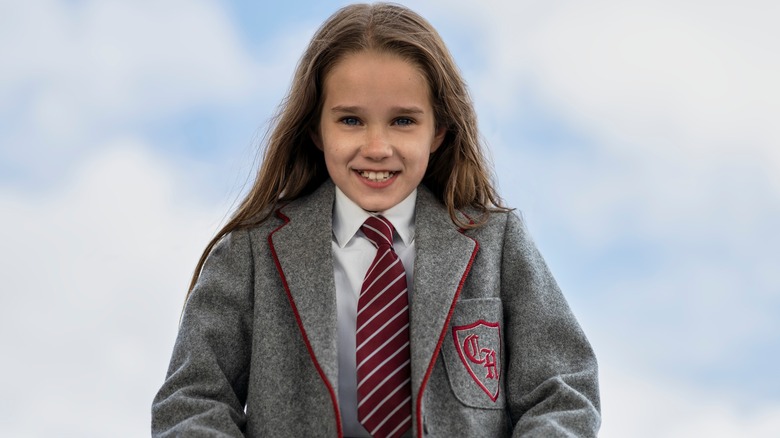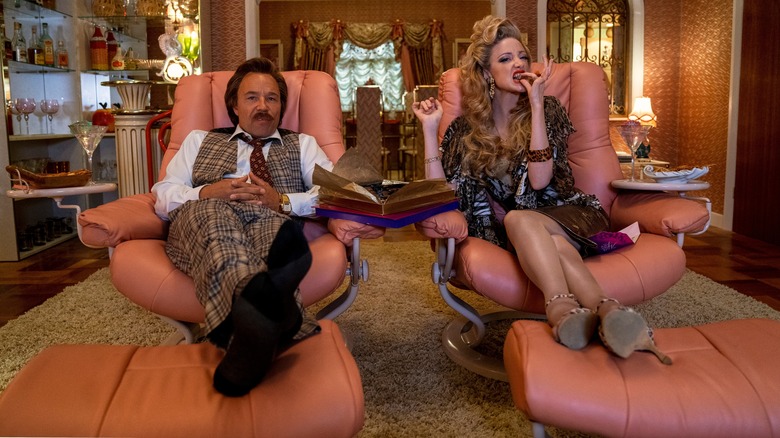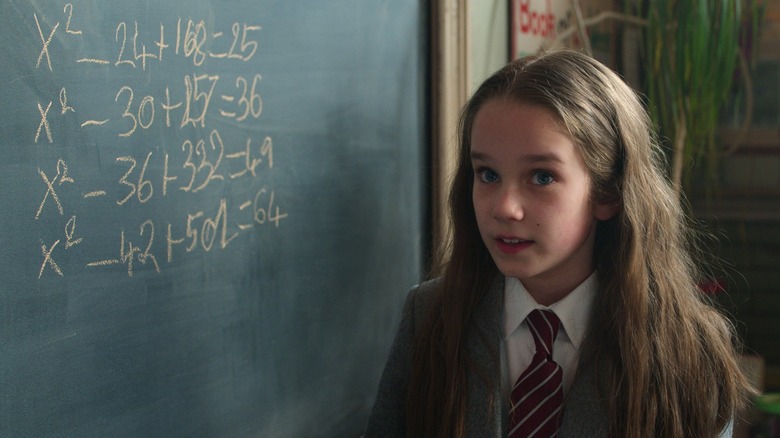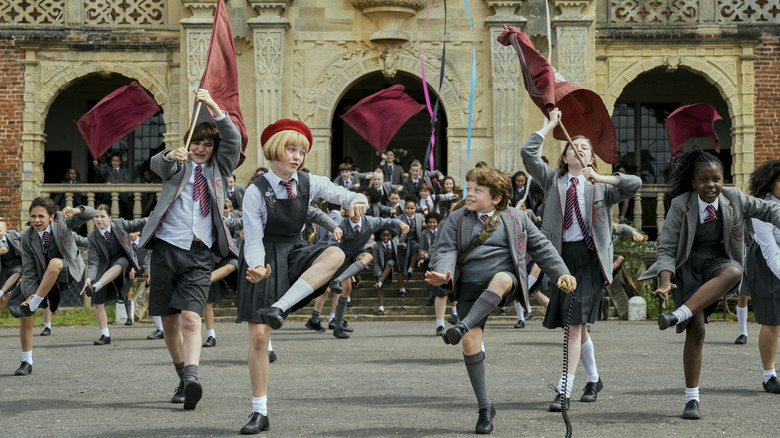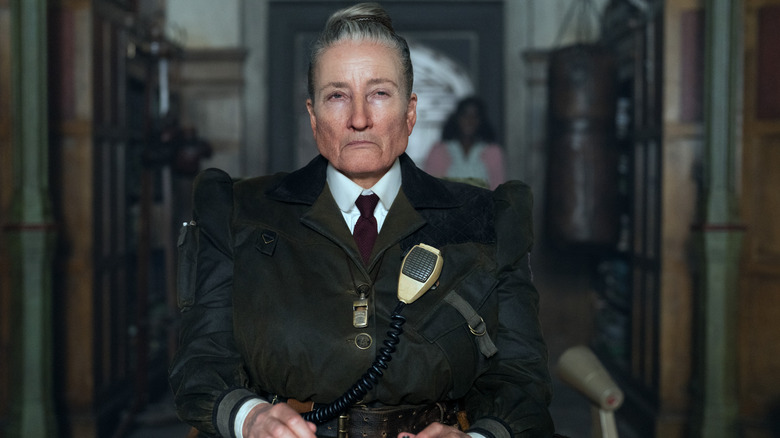Matilda Review: A Deliciously Dark Revenge Tale With A Sweet Center [London Film Festival]
Director Matthew Warchus had quite a mountain to climb with "Matilda" (or, to use its full title, "Roald Dahl's Matilda the Musical"). Not only is the film an adaptation of one of the most beloved British children's books of all time, it's directly adapted from a musical based on the book. Debuting in 2011, with Warchus also directing the original stage production, "Matilda the Musical" was written by Dennis Kelly with music and lyrics by comedian/songwriter Tim Minchin.
Movie musicals have had a patchy record of success over the past decade or so (admittedly not helped by Tom Hooper throwing off the curve), and getting general audiences onboard with characters bursting into song is always a bit of an obstacle. Add in the fact that the cast of this particular musical is predominantly made up of children, and finding good child actors is hard enough without also requiring them to be able to sing and dance. Oh, and there's already a movie adaptation of this particular book that many consider to be the definitive version. With all those challenges in the way, it would take a miracle to make "Matilda" work.
Fortunately, miracles happen to be Matilda Wormwood's (Alisha Weir) speciality. The fierce young lead, backed by a delightful and talented ensemble of young performers, brings the spirit of Roald Dahl's beleaguered young protagonist to life in a film that has all the sharp edges and dark corners that made Dahl's writing such a treat.
Meet the Wormwoods
A common tactic in children's stories, to free up the young hero for both adventure and peril, is to take one or both biological parents out of the picture. The protagonist might be an orphan raised by a benevolent grandparent or a malevolent stepmother, or they might have been stolen away from their real parents as a child, or they might temporarily run away from home. But however it happens, they usually end up fending for themselves in one way or another. After all, how much trouble can a child get into while they still have loving parents around to keep an eye out for them?
Dahl himself contributed to the orphan trend with several of his books, but "Matilda" presents a much rarer (and sadly more realistic) scenario: Matilda's mother and father are alive, and she lives with them, but they're terrible people and even worse parents. Mrs. Wormwood (Andrea Riseborough, delightfully hamming it up beneath a mass of hair extensions and animal prints) discovers to her surprise and disgust that she is pregnant, comically oblivious to her beachball-sized stomach, on the day that Matilda is delivered. Mr. Wormwood (Stephen Graham) is offended by the fact that the surprise baby is not, as the balloons he brought to the hospital declare, a boy, and treats Matilda's existence as a personal insult.
Lamenting their misfortune as the other new parents around them celebrate their precious bundles of joy in the grand opening number, "Miracle," the Wormwoods reluctantly take their unwanted baby home. The film doesn't sugarcoat life in the Wormwood house: Matilda lives in a dingy attic room, raised mostly by books. Her mother talks about her like she's an inanimate object ("you forgot to send it to school!" she berates Mr. Wormwood when an inspector shows up at their home) and her father, having decided to take the opinion of his balloons over the opinion of the maternity ward doctor, steadfastly insists on referring to Matilda as a boy.
Carrie for kids
The students of Crunchem Hall are in agreement with their monstrous headmistress on one thing: the children are revolting. "Matilda" is not a story about a sad little girl passively waiting to be rescued from her miserable life; it's fundamentally about the joy of rebellion and revenge. Throw in some telekinetic powers that emerge from Matilda being trapped in a situation where her preternatural intelligence is never really challenged, and "Matilda" is basically "Carrie" for kids. Young lead Alisha Weir is at her best when Matilda becomes possessed by the spirit of revenge, and once she masters her powers, there are nods to Brian de Palma's 1976 adaptation of the Stephen King novel in extreme close-ups of Matilda's maliciously squinting eyes.
Of her two parents, Mr. Wormwood is the only one who really acknowledges her as a human being — and this recognition comes in the form of bullying and mistreatment. This kicks off the silent war between Matilda and her father as she takes petty revenge by dyeing his hair green and sticking his hat to his head with superglue.
Matilda is counseled by friendly mobile librarian Mrs. Phelps (Sindhu Vee) that two wrongs don't make a right, and it's best to be the better person, turn the other cheek etc. Refreshingly, both Matilda and "Matilda" reject this message. As our young heroine points out in her first solo number, "Naughty," she is not Cinderella and there's no fairy godmother coming to wave a magic wand and fix all of her problems if she just stays patient and virtuous. Passivity in a protagonist is boring to watch, but Matilda further argues that to experience oppression without retaliation is to be complicit: "If you always take it on the chin and wear it/You might as well be saying you think that it's okay."
It's a subversive message, but given the current state of the world and everything that kids Matilda's age have already lived through, it might be the message they need right now. Who could blame the current generation of children for thinking that grown-ups are more likely to ignore problems — or make them worse — than do anything to fix them? The total lack of parental support throughout her young life has taught Matilda that "nobody else is going to put it right for me" and, well, she's not wrong. While the timid, sweet-natured teacher Miss Honey (Lashana Lynch) tries to shield her students from the worst of Crunchem Hall, ultimately it's up to Matilda to save the day.
Meet the maggots
Though there's plenty of prestige in the grown-up cast, the true stars of "Matilda" are the kids, with a tremendous young ensemble cast backing the movie's miniature Spartacus. Ellen Kane, the choreographer for the original "Matilda the Musical" stage show, returned to oversee the dance numbers for the movie. It must have taken an exhausting number of rehearsals to achieve, but the ensemble of "Matilda" move in perfect synchronicity, like the cogs in the machine that Crunchem Hall is determined to turn them into. Among the supporting cast of kids, Meesha Garbett is a standout in a small role as Crunchem's resident bad girl and detention veteran Hortensia, who delights in describing the worst horrors that the school has to offer.
Crunchem Hall itself is something straight out of a horror movie (or a certain Pink Floyd music video). Costume clues point to "Matilda" being set some time in the 1980s, but the combination of corporal punishment and a rigid focus on discipline draw up from the roots of Roald Dahl's own childhood. After experiencing his first caning at the tender age of eight, Dahl was sent away to boarding school, where such beatings were a routine tool of discipline. "All through my school life I was appalled by the fact that masters and senior boys were allowed literally to wound other boys, and sometimes quite severely," he wrote in his memoir. "I couldn't get over it. I never have got over it."
So while the punishments doled out by Miss Trunchbull (Emma Thompson) in "Matilda" are cartoonish — picking a girl up by her pigtails to throw her like her a hammer, picking a boy up by his ears, and forcing poor Bruce Bogtrotter (Charlie Hodson-Prior) to consume a dangerous amount of chocolate cake — there is a genuine sense of outrage in the film. Rather than softening the edges of Dahl's work, "Matilda" goes even darker in its depiction of the dreaded "Chokey," an unholy hybrid of solitary confinement and an iron maiden, whose shadow looms over the children of Crunchem as one of the most brutal tools in Trunchbull's arsenal.
The misguided casting of Miss Trunchbull
Yes, what about Miss Trunchbull? If it seems like the main villain of "Matilda" has gotten little mention in this review, it's because ... well, there isn't much to write about. "Matilda" joins the current trend where, in lieu of casting character actors with striking or unusual looks, Hollywood simply takes a conventionally attractive star and sticks prosthetics all over their face in an effort to try and make it more interesting. Add in the armor of a body suit to try and build up her physique, and Emma Thompson is scarcely visible. The lower half of her face is largely frozen by an artificial jawline, and her physicality is limited by the padding. It's not Thompson's fault (this film is a waste of her considerable talents), but there's no question that Pam Ferris is still the definitive Miss Trunchbull.
Still, Trunchbull still works well enough as a monster, in the same way that the mechanical T-rex in "Jurassic Park" did. She lumbers around Crunchem Hall like a bulldozer, the sound design adding booming footsteps and camera angles accenting her towering size. In a particularly memorable piece of choreography, the children have to hastily drag their tables out of the way when she strides across the cafeteria because she refuses to walk around them. Thompson also gets a couple of good villain songs, including one that reveals Trunchbull to be basically a horse girl on steroids (possibly literally).
The real heart of "Matilda," as it was in the book and in the 1996 film, is the relationship between Matilda and Miss Honey. Lynch's impressive singing voice brings to life the musical's sweeter songs, which are a necessary balance for the relentless peril of the story and the nastiness of most of the other grown-ups. Miss Honey's own miserable childhood is revealed as a parallel to Matilda's, though instead of open rebellion, she found quieter ways to carve out a place for herself in the world. The bond between the two characters, and the manner in which they end up rescuing each other, will doubtless have a few audience members shedding tears.
With lush, fun cinematography, creative staging, and some true powerhouse music and dance numbers, the strengths of "Matilda" more than make up for its weaknesses. Here's to the children of the revolution.
/Film rating: 8 out of 10
